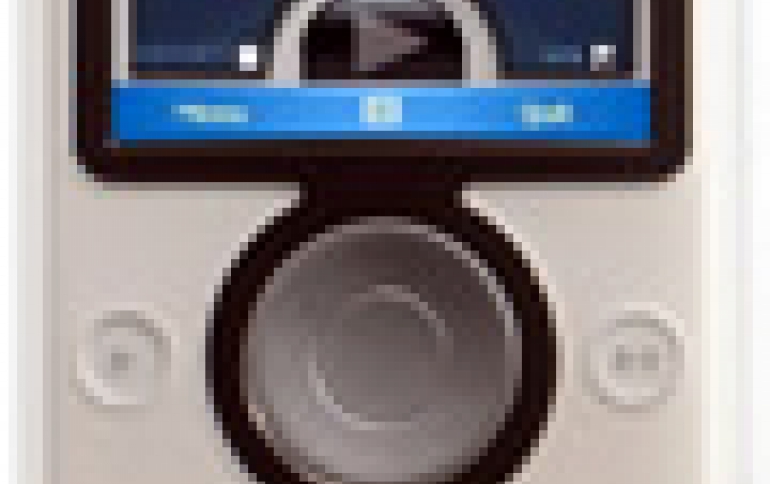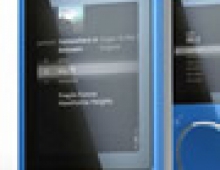
Toshiba to Build Microsoft Challenge to iPod MP3 Players
Microsoft's challenge to Apple's reigning iPod MP3 players will be built by Toshiba and allow people to "DJ" by wirelessly sharing music, US regulatory agency filings showed.
Plans submitted to the Federal Communications Commission by Japanese electronics giant Toshiba provided a glimpse at the workings of an MP3 player designed by Microsoft Corporation based in Redmond, Washington.
The device was referred to in the filing by the code name "Pyxis."
Microsoft has vowed to release a "Zune" MP3 player and matching online music and video store in time for the year-end holiday shopping season.
The Microsoft MP3 player would tune in to FM radio as well as enable users to transfer video, pictures and music files between personal computers and the handheld devices.
The MP3 players would also be able to link wirelessly, according to an instruction manual included in the FCC paperwork.
"You will be able to send and receive photos and promotional copies of songs, albums, and playlists from other Pyxis users," the manual indicated.
Music could be selectively streamed live to as many as four other MP3 players by using a feature labeled "DJ," according to the manual.
"Once your DJ setting is on, you don't need to do anything else in order for others to listen to your stream," the manual explained. "If someone tunes in, you will see an onscreen notification that you have a listener."
Pictures and sketches included with the FCC filing by Toshiba depicted a device the size of a notepad and with a track-wheel control akin to the iPod look.
Nearly two-thirds of the face was devoted to screen and specifications indicated it would have a hard drive with 30 gigabytes of memory.
Cupertino, California, based Apple makes iPod models with 30 and 60 gigabytes of hard drive memory.
Microsoft planned to go head-to-head with Apple's iPod player and iTunes online music store, according to analysts who were briefed on the Zune project.
"Under the Zune brand we will deliver a family of hardware and software products, the first of which will be available this year," the software giant's marketing manager Chris Stephenson said in a July statement.
"We see a great opportunity to bring together technology and community to allow customers to explore and discover music together."
The Microsoft device, dubbed "iPod killer" by the media, would do what the iPod can't: allow users to wirelessly download music.
However, customers don't all value wireless connectivity because it gobbles battery power, costs more, and isn't an easy way to search for music, according to industry research.
Toshiba has long used Microsoft's software in its products, dating back to its first laptop in 1985. The company has also made portable media players and handheld computers using the slimmed-down Windows CE operating system.
Last year, the two companies inked a patent cross-licensing pact and also spoke at the time of working together on "new breakthrough innovations that will bring about new scenarios for years to come."
The device was referred to in the filing by the code name "Pyxis."
Microsoft has vowed to release a "Zune" MP3 player and matching online music and video store in time for the year-end holiday shopping season.
The Microsoft MP3 player would tune in to FM radio as well as enable users to transfer video, pictures and music files between personal computers and the handheld devices.
The MP3 players would also be able to link wirelessly, according to an instruction manual included in the FCC paperwork.
"You will be able to send and receive photos and promotional copies of songs, albums, and playlists from other Pyxis users," the manual indicated.
Music could be selectively streamed live to as many as four other MP3 players by using a feature labeled "DJ," according to the manual.
"Once your DJ setting is on, you don't need to do anything else in order for others to listen to your stream," the manual explained. "If someone tunes in, you will see an onscreen notification that you have a listener."
Pictures and sketches included with the FCC filing by Toshiba depicted a device the size of a notepad and with a track-wheel control akin to the iPod look.
Nearly two-thirds of the face was devoted to screen and specifications indicated it would have a hard drive with 30 gigabytes of memory.
Cupertino, California, based Apple makes iPod models with 30 and 60 gigabytes of hard drive memory.
Microsoft planned to go head-to-head with Apple's iPod player and iTunes online music store, according to analysts who were briefed on the Zune project.
"Under the Zune brand we will deliver a family of hardware and software products, the first of which will be available this year," the software giant's marketing manager Chris Stephenson said in a July statement.
"We see a great opportunity to bring together technology and community to allow customers to explore and discover music together."
The Microsoft device, dubbed "iPod killer" by the media, would do what the iPod can't: allow users to wirelessly download music.
However, customers don't all value wireless connectivity because it gobbles battery power, costs more, and isn't an easy way to search for music, according to industry research.
Toshiba has long used Microsoft's software in its products, dating back to its first laptop in 1985. The company has also made portable media players and handheld computers using the slimmed-down Windows CE operating system.
Last year, the two companies inked a patent cross-licensing pact and also spoke at the time of working together on "new breakthrough innovations that will bring about new scenarios for years to come."





















